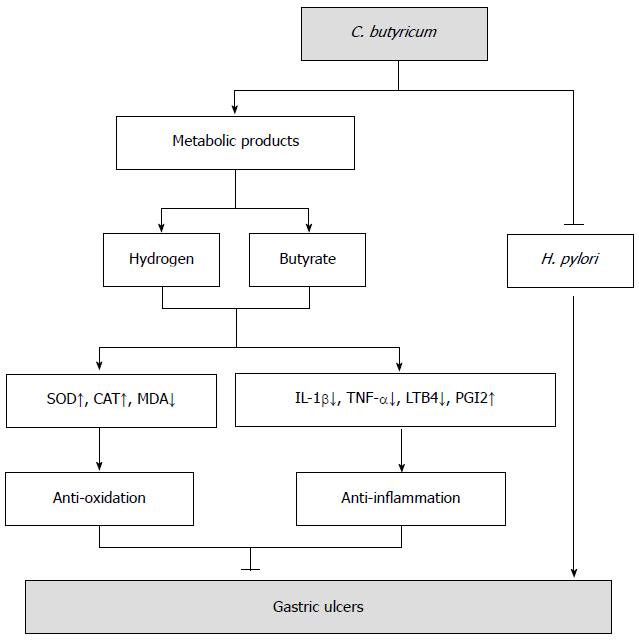Copyright
©The Author(s) 2015.
World J Gastroenterol. Jul 21, 2015; 21(27): 8340-8351
Published online Jul 21, 2015. doi: 10.3748/wjg.v21.i27.8340
Published online Jul 21, 2015. doi: 10.3748/wjg.v21.i27.8340
Figure 7 The hypothetical model of Clostridium butyricum protective effect on gastric ulcers induced by stressful stimuli.
In addition to competitive inhibition of Helicobacter pylori, as reported by previous studies[17], Clostridium butyricum (C. butyricum) protects gastric mucosa from lesions through at least two different mechanisms: anti-oxidation and anti-inflammation. The metabolites of C. butyricum, such as butyrate and hydrogen[52], enhance the activity of antioxidases [superoxide dismutase (SOD) and catalase (CAT)], reduce the production of proinflammatory factors [interleukin (IL)-1β, tumor necrosis factor (TNF)-α, leukotriene B4 (LTB4)] and promote the production of anti-inflammatory prostaglandins (PGI2), thus exerting protective effect on gastric ulcers by resolving peroxidation and alleviating exaggerated inflammation induced by various stresses.
-
Citation: Wang FY, Liu JM, Luo HH, Liu AH, Jiang Y. Potential protective effects of
Clostridium butyricum on experimental gastric ulcers in mice. World J Gastroenterol 2015; 21(27): 8340-8351 - URL: https://www.wjgnet.com/1007-9327/full/v21/i27/8340.htm
- DOI: https://dx.doi.org/10.3748/wjg.v21.i27.8340









